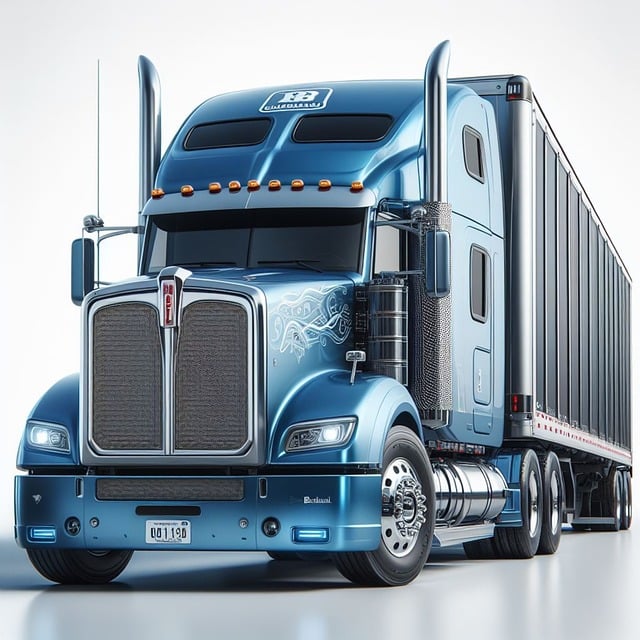The lifecycle of truck batteries from production to disposal has a significant environmental impact that necessitates careful analysis. Ethical sourcing of critical materials like lithium, cobalt, and nickel is crucial due to their extraction's potential habitat disruption and water pollution. The operation phase of these batteries further contributes to the environmental footprint through energy consumption, often from non-renewable sources. Addressing this, sustainable practices include adopting renewable energy for charging and advancing battery technology for improved efficiency. Responsible recycling at the end of a battery's life is essential to minimize ecological damage and recover valuable materials, reducing reliance on new raw material extraction. The transition from traditional lead-acid batteries to lithium-ion alternatives, which are more efficient, longer-lasting, and sustainable, is highlighted as a key environmental advancement. These modern batteries offer economic sustainability by lowering long-term maintenance and disposal costs. All stakeholders must commit to sustainable practices throughout the truck battery lifecycle to ensure ecological preservation for future generations. Proper disposal and recycling of hazardous components like lead, sulfuric acid, and cadmium are critical to prevent environmental contamination. The expansion of smart grid technology in charging processes further supports sustainability and operational cost savings in the logistics sector. The growth of electric vehicle infrastructure is set to increase the prevalence of advanced lithium-ion truck batteries, leading to a cleaner transportation landscape and aligning with both environmental conservation and economic benefits. Keywords: truck battery lifecycle, sustainable practices, lithium-ion technology advancements, operational cost savings, smart grid integration, environmental impact reduction.
7 Tips for Minimizing Battery Impact on Ecosystems
As the transportation sector continues to evolve, the role of truck batteries in shaping environmental outcomes becomes ever more critical. This article delves into practical strategies for reducing the ecological footprint left by these power sources. From understanding the lifecycle impact of truck batteries to advocating for eco-friendly alternatives and responsible disposal methods, we explore a spectrum of solutions tailored for fleet owners, manufacturers, and consumers alike. By integrating innovative technologies, adhering to stringent regulations, and engaging in community efforts, we can collectively mitigate the environmental consequences associated with truck batteries. Join us as we navigate through seven actionable tips designed to foster sustainable operations and preserve our precious ecosystems.
- Understanding the Environmental Footprint of Truck Batteries
- Opting for Eco-Friendly Alternatives to Traditional Truck Batteries
- Proper Disposal and Recycling of Old Truck Batteries
- Innovative Technologies in Truck Batteries for Sustainable Operations
Understanding the Environmental Footprint of Truck Batteries

When considering the environmental footprint associated with truck batteries, it’s crucial to examine the lifecycle impacts from production to disposal. The manufacturing process of truck batteries involves significant resource extraction, including the mining of metals and minerals such as lithium, cobalt, and nickel. These materials are essential components of modern truck batteries, enabling them to store and deliver energy efficiently. However, their extraction can lead to habitat disruption and water contamination, underscoring the need for responsible sourcing practices.
Once in use, the operational phase of a truck battery also carries an environmental burden. The energy consumption during charge-discharge cycles contributes to the overall carbon footprint, as the electricity required may come from non-renewable sources. To mitigate this impact, integrating renewable energy sources for charging and optimizing battery efficiency through advanced technologies can significantly reduce the environmental strain. At the end of their service life, recycling and proper disposal are key to minimizing the ecological harm. Effective recycling programs can recover valuable materials, reducing the need for additional raw material extraction and lessening the impact on ecosystems. It’s imperative for industries and consumers alike to prioritize sustainable practices in the truck battery lifecycle to ensure a reduced environmental footprint.
Opting for Eco-Friendly Alternatives to Traditional Truck Batteries

When considering the impact of batteries on ecosystems, the transition from traditional lead-acid truck batteries to more sustainable alternatives is a critical step. These conventional batteries contain sulfuric acid and lead dioxide, substances that can be hazardous to both aquatic and terrestrial life if improperly disposed of or leaked during use. Opting for eco-friendly alternatives such as lithium-ion truck batteries not only mitigates these risks but also enhances efficiency and performance. Lithium-ion batteries offer a longer lifespan, can be recycled more effectively, and store energy more efficiently than their traditional counterparts. This shift is not just beneficial for the environment; it also aligns with economic sustainability, as maintaining and disposing of lithium-ion batteries are often less costly in the long term. By adopting these green technologies, the transportation industry can significantly reduce its environmental footprint while ensuring a reliable source of power for critical truck operations. It is imperative for manufacturers, distributors, and end-users to recognize the importance of integrating eco-friendly solutions like lithium-ion truck batteries into their practices to protect and preserve our ecosystems for future generations.
Proper Disposal and Recycling of Old Truck Batteries

When a truck battery reaches the end of its service life, it’s imperative to handle its disposal responsibly to prevent environmental harm. Truck batteries contain hazardous materials such as lead, sulfuric acid, and cadmium, which can be detrimental to soil and water if disposed of improperly. Proper disposal begins with careful removal of the battery by a certified professional who understands the safety protocols necessary to prevent spills or leaks. Once removed, recycling is the most environmentally sound option. Recycling centers specialized in automotive batteries can recover approximately 98% of a truck battery’s lead content, effectively repurposing this material for new batteries or other lead-based products. This process not only conserves natural resources but also mitigates the environmental impact associated with mining and processing virgin materials. It’s crucial for businesses and individuals alike to utilize local recycling facilities that adhere to state and federal regulations, ensuring that each component of the battery is disassembled and processed correctly to avoid contamination. By prioritizing the responsible disposal and recycling of old truck batteries, we contribute to a healthier ecosystem and support sustainable practices within the trucking industry.
Innovative Technologies in Truck Batteries for Sustainable Operations

The advent of innovative technologies in truck batteries has significantly contributed to the sustainability of logistics and transportation operations. Advancements in lithium-ion technology have led to the development of truck batteries that offer increased energy density, efficiency, and longevity. These high-performance batteries not only extend the operational range of electric trucks but also reduce the reliance on fossil fuels, thereby minimizing the carbon footprint associated with traditional diesel engines. Moreover, the integration of smart grid technology allows for better management of energy usage and charging schedules, which can be optimized based on grid availability and demand patterns. This results in a more efficient and sustainable energy utilization across the transportation sector. The adoption of these technologies not only supports environmental conservation but also paves the way for economic benefits by lowering operational costs over time. As the infrastructure for electric vehicles expands, the potential for widespread implementation of these advanced truck batteries grows, promising a greener future for transportation ecosystems.
In conclusion, addressing the environmental impact of truck batteries is a multifaceted endeavor that requires a concerted effort from manufacturers, operators, and recycling facilities. By understanding the environmental footprint of these batteries, opting for eco-friendly alternatives to traditional ones, ensuring proper disposal and recycling, and embracing innovative battery technologies, we can significantly minimize their ecological effects. It’s crucial to consider the long-term implications of battery use in transportation and to actively engage in practices that support sustainable operations within this sector. Implementing these seven tips for minimizing battery impact on ecosystems will contribute to a greener future for trucking and beyond.



